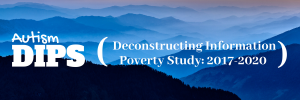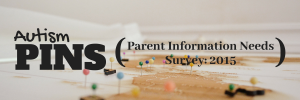My Google Scholar page: https://scholar.google.com/citations?user=U0n-TIEAAAAJ&hl=en&oi=ao
My Carolina Digital Repository page (pre/post-prints of many of my articles can be found here): https://cdr.lib.unc.edu/search?anywhere=amelia+gibson
Much of my community engaged disability informatics work can be found at the CEDI workgroup website: http://cedi.web.unc.edu/
Deconstructing Information Poverty Study (DIPS)

Autism DIPS @ UNC is a community-centered initiative to increase understanding and strengthen local information services and resources in support of individuals on the autism disorder spectrum (ASD) and their families. DIPS is funded by the Institute of Museum and Library Services and partners with the Autism Society of North Carolina, Durham County Library and Charlotte-Mecklenburg Public Library to improve services for people in the state of North Carolina and around the United States.
For more on DIPS, visit http://cedi.web.unc.edu/deconstructing-information-poverty-study-dips/
Healthy Girls Know: Young Black Women and Personal Geographies of Information Seeking (2017)
This pilot youth participatory action study examines the construction of personal geographies of information seeking for young black women (ages 14-18 years) in Durham, North Carolina. Eight participants will join a 9-month cohort to examine health information seeking among themselves and their peers. As participatory research focused on centering girls’ voices, the research process will be oriented toward co-construction of findings (and partial co-construction of analysis). This study is funded by the University of North Carolina at Chapel Hill through a Junior Faculty Development Grant and through the School of Information and Library Science Kilgour Award.
Autism Parent Information Needs Study (PINS)
This 2015 internet-based survey of 935 parents of children and adults on the autism spectrum in North Carolina examined parents’ information needs, information seeking habits, positive and negative information seeking experiences, and how and where they chose to look for information related to their children.Early data analysis indicated that parents’ information needs changed with their children’s ages, that parents consulted local information sources most frequently for information related to raising children with ASD (although those local sources were accessed via the Internet), and that trust and relationship was a major factor in selecting information sources.
PINS Publications:
Paper: Gibson, A. N., Kaplan, S. K., & Vardell, E. (2017). A survey of information source preferences of parents of individuals with Autism Spectrum Disorder. Journal of Autism and Developmental Disorders, (FirstOnline). doi:10.1007/s10803-017-3127-z
Gibson, A. N., & Hanson-Baldauf, D. (in press). Beyond Sensory Story Time: An Intersectional Analysis of Information Seeking Among Parents of Autistic Individuals. Library Trends.
Poster/Short Paper: http://dl.acm.org/citation.cfm?id=2857130
For more on PINS, visit http://cedi.web.unc.edu/autism-pins-parent-information-needs-survey/
Information exchange, seeking, and access for parents of individuals with Down syndrome
This grounded theory study examines health-related information seeking among parents of individuals with Down syndrome. Findings focused on three areas: place as key to understanding information seeking within marginalized groups; information seeking and sharing among parents of individuals with Down syndrome as locally and community oriented, and information access informing participants’ satisfaction with their local communities; and information seeking (particularly after diagnosis) as a progressive situational process involving internal and external factors over time.
Paper: Gibson, A. N. (2016). Building a Progressive-Situational Model of Post-Diagnosis Information Seeking for Parents of Individuals With Down Syndrome. Global Qualitative Nursing Research, 3. (http://journals.sagepub.com/doi/full/10.1177/2333393616680967)
Paper: A better place? Factors in community assessment for parents of children with Down syndrome (http://onlinelibrary.wiley.com/doi/10.1002/meet.2014.14505101063/full)
Other work:
The Influence of Place-based Communities on Information Behavior: A Comparative Grounded Theory Analysis (Dissertation)
This multi-method study of two communities of parents in Florida explored connections among community, place, information worlds and information needs. Data collection methods included Information horizons mapping (interview, social network mapping) and participant mapping of local communities). Data analysis methods included analysis of local maps, grounded theory analysis of interviews, and social network analysis. The study found differences in information behaviors on the community level, including technology and social media usage. Discussion highlighted issues of special concern to the study groups, substantive best practices and suggestions for improvement by local agencies, and considerations regarding information access, needs and behaviors of local communities.
Latinas and IT
Qualitative study exploring issues surrounding gender and participation (or non-participation) of women of Latin American descent in the IT sector. Explored early iterations of Theory of Information Worlds, with a focus on gender as a boundary object. Conducted grounded theory analysis of interviews. Findings can be found here: http://firstmonday.org/ojs/index.php/fm/article/view/2581/2286
Public Libraries and E-Government Project
Data collection from public libraries in Florida regarding patron use of E-Government in libraries documented an increase in the use of libraries for information-seeking (and for conducting transactions) that previously would have been done within a government office. The data collection included workshops with 145 public librarians, 415 logs of user requests, 210 patron surveys, and 46 librarian surveys. Findings published in the Proceedings of the 42nd Hawaii International Conference on System Sciences. Oversaw data collection including co-design and distribution of data collection instruments, liaising with participants, data analysis and publication of results.
Emerging role of public librarians as e-government providers
E-Learning Experiences of On-Campus students
Qualitative study exploring the affective experiences of on-campus students enrolled primarily in on-line courses. Explored factors related to sense of community and the online classroom, participation, and students’ perceptions of instructors and the e-learning environment. Conducted grounded theory research and analysis. Results and discussion can be found here: http://www.igi-global.com/book/advancing-library-education/72162
[/vc_column_text][/vc_column][vc_column width=”1/3″][vc_widget_sidebar sidebar_id=”page-sidebar-researchpage”][/vc_column][/vc_row]
